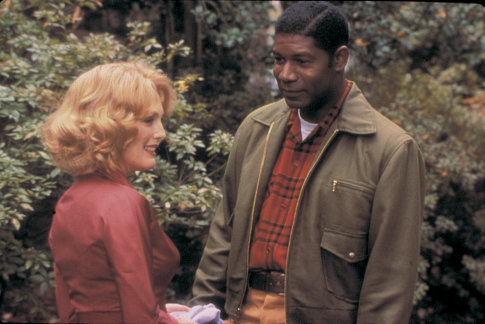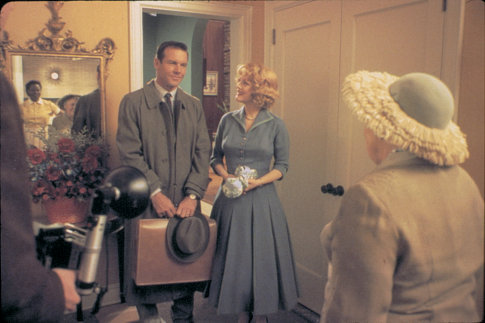 The film takes a similar tack in its treatment of race. As the recent events surrounding
Trent Lott have reminded us, the issues of race that were current in the 1950s
are still, mutatis mutandis, with us. Far From Heaven is
loosely based on Sirk's 1955 film All that Heaven Allows, which was
about an older divorcée (Jane Wyman) falling in love with a young gardener (Rock Hudson).
But in Far From Heaven the gardener is African-American, a twist that would have
been impossible for Sirk; it was not until Guess Who's Coming to Dinner in 1967
that an interracial kiss made it to mainstream Hollywood, and the following year that
Star Trek first brought one to US television. Haynes' portrayal of an interracial
relationship rather than an intergenerational one is, like his portrayal of
Frank's homosexuality, one that would not have flown for Sirk at Universal in the 1950s,
and yet, ironically, Sirk's melodramatic style is ideally suited to the tale.
The film takes a similar tack in its treatment of race. As the recent events surrounding
Trent Lott have reminded us, the issues of race that were current in the 1950s
are still, mutatis mutandis, with us. Far From Heaven is
loosely based on Sirk's 1955 film All that Heaven Allows, which was
about an older divorcée (Jane Wyman) falling in love with a young gardener (Rock Hudson).
But in Far From Heaven the gardener is African-American, a twist that would have
been impossible for Sirk; it was not until Guess Who's Coming to Dinner in 1967
that an interracial kiss made it to mainstream Hollywood, and the following year that
Star Trek first brought one to US television. Haynes' portrayal of an interracial
relationship rather than an intergenerational one is, like his portrayal of
Frank's homosexuality, one that would not have flown for Sirk at Universal in the 1950s,
and yet, ironically, Sirk's melodramatic style is ideally suited to the tale.
Julianne Moore's character, Cathy, initially appears as clichéd as the tropes of Sirk's
films, with her perfect hair, sunny disposition, and totemic
status in the society around her. And yet Cathy's experience is at the heart of the film.
Early on, Cathy's ginger-haired daughter, watching her mother put on her makeup
in the mirror, asks if she will grow up to be like her, and Cathy answers yes.
This is another irony: we know that most girls who were born in 1950 did not do
any such thing -- they questioned all the boundaries that shape Cathy Whitaker's life,
the same boundaries that explode during the plot of the film. And yet, Cathy changes
from the acquiescent, subservient wife to the curious citizen, and finally to a sort
of liberated woman; maybe she was telling her daughter the truth after all. Teasingly
called 'Red' in her youth, Cathy is a character caught between that word's different
connotations: her 'Communist' (i.e. liberal) tendencies that surface
 in her relationship with the saintly black gardener Raymond (Dennis Haysbert), in the face of ostracization; the Fall leaves and the ending of one cycle of life; and her red hair that has faded, in her middle age, to strawberry blonde.
in her relationship with the saintly black gardener Raymond (Dennis Haysbert), in the face of ostracization; the Fall leaves and the ending of one cycle of life; and her red hair that has faded, in her middle age, to strawberry blonde.
Cathy's bewilderment is partly due to the lack of alternatives provided
by the media, which pervades her 1950s life as much as it now pervades our own. Frank and Cathy Whitaker are icons: "Mr. and Mrs. Magnatech," so named because they model the perfect couple in an advertising campaign for Frank's employer, Magnatech televisions. The Whitakers' complicity with the media (the televisions they sell, the magazines they fill) demands hypocrisy. They are supposed to embody love, but Frank's love must be denied; supposed to embody good citizenship, but Cathy's liberalism leads to tragedy. A local magazine reporter follows Cathy around with a photographer just to confirm she is living up to her and society's ideal, though she begins to cause trouble by noting how Cathy is "kind to Negroes."



film politics music jay's head poetry art josh ring fysche saddies about archive